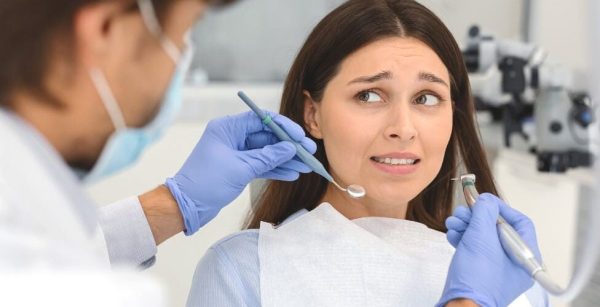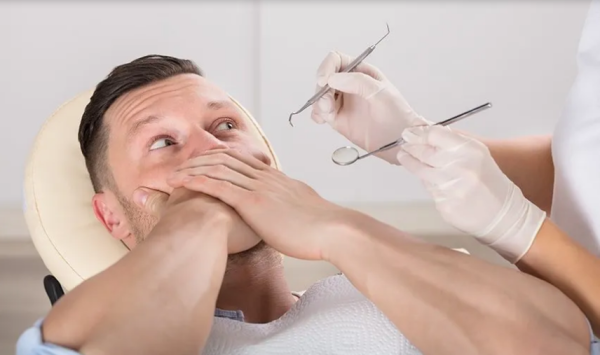Dental anxiety is a real fear for some people. Anxiety or stress associated with a dental appointment; being afraid during a visit to the dentist may result in delaying or avoiding dental treatments.
Do things like needles, drills or sitting in the dental chair trigger any dental anxieties?
When dental anxiety is severe and causes irrational fear and avoiding going to the dentist, it can be classified as a dental phobia.
Some mental health conditions including generalized anxiety disorder and post-traumatic stress disorder (PTSD), or a previous history of head and neck trauma can increase the risk of a person experiencing dental anxiety. Other conditions such as depression, bipolar disorder or schizophrenia may also increase the risk of anxiety disorder.
Signs and symptoms of dental anxiety
People with dental anxiety may experience:
- Heart racing or palpitations
- Low blood pressure or possible fainting
- Emotions, tears, or feelings of panic
- Withdrawn, use of humor or aggression to mask nervousness
Anxious people often miss dental appointments to avoid a dental treatment regardless of the type of dental procedure; simple or complex.

Dental anxiety may affect your oral health; avoiding the dentist may result in dental problems worsen from lack of care. Your teeth or gums may become infected or emergency care may be necessary if gone untreated. A simple procedure may turn into something more expensive and complex when waiting too long for a much needed treatment. Putting your procedure off will most likely feed the underlying problem and increase dental anxiety. This is a ‘vicious cycle of anxiety.
Regular dental check-ups, cleans and X-rays of the teeth can prevent dental disease and help the dentist find any problems early, so that simpler and less invasive treatments are needed. During regular check-ups, dentists also check for signs of mouth cancer, which is especially important for those who smoke or regularly drink alcohol, and even more so for those who do both. If you notice a mouth ulcer that lasts for longer than 2 weeks, get it checked by a dentist as soon as you can.
Most dental disease is lifestyle-related and preventable. By avoiding going to the dentist, not only are you more likely to need more complex treatments when you do finally attend, but you are also missing out on learning how to better care for your oral health.
The lifestyle factors that lead to dental disease are very similar to those that lead to diabetes, obesity, heart disease, stroke and some cancers (regularly consuming sugary food and drinks, smoking and regularly drinking alcohol). So, taking care of your oral and general health and remembering to brush your teeth twice a day and floss once a day are very important.
Dental anxiety may be caused by:
- Phobias
- A prior traumatic dental experience
- Health issues
- Head or neck aches
- Stress or depression
- Fear of losing control
- Trust issues
- the view that the mouth is a personal area and accessing the mouth is an invasion of personal
Anxiety associated with other conditions such as agoraphobia, fear of being in situations where you feel you cannot escape, claustrophobia, fear of closed o tight spaces, or obsessive compulsive disorder where there is an obsession of cleanliness.

Are You Susceptible to Dental Anxiety?
Dental anxiety is common and can affect people of any age.
Children who have had bad dental experiences in most cases can overcome their fear if the situation is managed well and they are well cared for and supported during further dental visits. Adults who are anxious about dental care tend to remain anxious throughout life.
Many anxious dental patients can find a dentist who is sympathetic to their situation, so they are able to cope with going to the dentist.
How to Manage Dental Anxiety or Phobia
There are many ways to help people manage dental anxiety or phobia. It is important to let the dentist know if you experience any level of dental anxiety. Open discussion around the individual triggers of anxiety can help the dentist work with you to tailor a management plan for you.
Some psychological coping techniques include:
- deep breaths
- meditation
- distraction (listening to music through earbuds)
- guided imagery
- progressive muscle relaxation
- agree with your dentist on a signal to stop during the treatment for a break (such as raising your left pointer finger or hand)
- bring a weighted blanket to help you feel more secure
- hypnosis.
Referral to a psychologist can be helpful too. Short, targeted therapies including cognitive behavioural therapy can be very successful.
Severe dental anxiety or phobia may require medical management with relative analgesia (happy gas), anxiety relieving medication, conscious sedation (twilight sedation) or general anaesthesia.
Relative analgesia (happy gas)
Known as happy gas or laughing gas, nitrous oxide can help people relax during dental treatment. A mask is fitted to your face, and you breathe a mixture of oxygen and nitrous oxide. It takes effect within a few minutes and wears off quickly.
You will feel relaxed but will still be awake. You can talk to the dentist, and hear what they say to you, but you won’t necessarily remember everything once the visit is over.
For most people, the relaxed sensation created by nitrous oxide sedation is very pleasant. Occasionally people don’t like the sensation it creates, and other options can be considered.
Anxiety relieving medication (oral anxiolytic tablets)
Oral anxiety relieving (anxiolytic) medications (such as temazepam) are sometimes prescribed by dentists or doctors to help anxious patients relax. A short-acting, small, single dose is usually taken one hour before the dental appointment.
Medication should only be taken following discussion with your dentist or doctor. You will need someone to accompany you to and from the dental visit as you cannot safely drive a car while under the influence of a sedative medication.
Conscious sedation
This type of sedation involves receiving medication through a drip placed into a vein of the arm or hand. Intravenous (IV) sedation is provided by a dental seditionist (a dentist with advanced training in sedation) or an anesthetist. It can be undertaken at a dental practice that has additional equipment, or in a hospital.
Under IV sedation (sometimes known as twilight sedation), you are relaxed and may drift off into a light sleep, but can respond to verbal prompts. Possible side effects include drowsiness and nausea after the procedure. You should not drive yourself home after IV sedation.
Not all dentists offer treatment under sedation. Some pre-existing medical conditions or medications may affect the type of sedation you can have, or may prevent you from having IV sedation. Talk to your dentist for further information.

General Aanaesthesia
Treatment under a general anaesthetic is carried out in a hospital setting by the dentist and an anaesthetist. General anaesthesia involves patients being ‘fully asleep’. Some possible side effects include nausea and a longer recovery time than other forms of sedation.
A general anesthetic may be a good option for some people, but remember that it doesn’t help you learn coping strategies for anxiety or get used to going to see the dentist.
You will need a pre-operative (before treatment) visit to the dentist, and a post-operative (after treatment) visit may also be required. The anesthetists will also need to assess you before the general anesthetic. You cannot drive yourself home after a general anesthetic.
Some dental treatments are better provided over several visits. This means that your treatment options may be more limited if you want all your dental treatment under general anesthetic.
In some instances, having some treatment done in the dental chair in a separate appointment before the general anesthetic will help prepare the mouth for the treatment that will be provided, to make best use of the general anesthetic session.
General anesthetic works best when used in conjunction with other strategies, so that some treatments can be done without general anesthetic. This way, the general anesthetic session time is kept for the treatments that are most difficult to cope with.
The key to coping with dental anxiety is to discuss your fears with your dentist. Once your dentist knows what your fears are, they will be better equipped to work with you and to determine the best ways to make you less anxious and more comfortable.